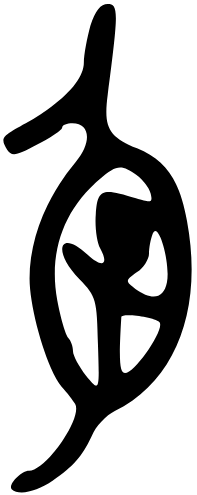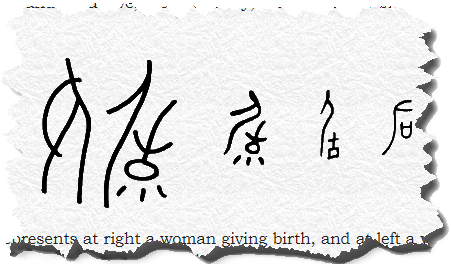Hexagram 12 – Blocked?
‘Blocking it, non-people.
Hexagram 12, the Oracle
Noble one’s constancy bears no fruit.
Great goes, small comes.’
However clearly we understand that there are no ‘bad’ hexagrams, we’re probably not over the moon when we cast Hexagram 12. It’s at least nice to be able to think that, if we could come up with some ‘noble one’s constancy’, it would bear fruit.
And yet… that feeling of stasis, frustration and head-meet-brick-wall futility are strongest when 12 is unchanging – Blocked with nowhere to go. When lines are moving, it tends to be about shifting the block – one way or another, with more or less success – much as Hexagram 18 tends to be about dealing with Corruption. 12’s moving line texts are lively and rich with imagery. For instance…
Bao 包, embracing
…bao 包, ’embracing’, in lines 2 and 3:
‘Embracing the charge.
Hexagram 12, line 2
Small people, good fortune.
Great people, blocked. Creating success.’
‘Embracing shame.’
Hexagram 12, line 3
The word means enveloping, enwrapping, encompassing, and also undertaking something – wrapping yourself round it, as it were, and making it your responsibility.
Hence in 12.2, ’embracing the charge’ has to do with accepting a task, internalising an order. As I put it, going on for 10 years (!!?!) ago:
“You are offered an agreement like a contract, with its own set of mutual expectations, requirements and compensations. To embrace it is to accept the terms you are given, and enter into their service – something which has an utterly different significance for small and great people.”
Commentary on 12.2 from I Ching, Hilary Barrett
Line 3 describes someone taking on and internalising shame in a similar way:
“You feel shame, and carry it enfolded within you, as part of yourself – whether or not you’re fully aware of its influence. Since you don’t feel entitled to anything much, you draw back into yourself and don’t feel able to ask directly for what you want or need.”
Commentary on 12.3 from I Ching, Hilary Barrett
You can get more of a feel for this one by looking at its position in the trigram-picture as a whole. Line 3’s just inside the threshold between inner and outer trigrams, looking (and leaning, and sometimes hankering) outward. But here, heaven’s above earth and moving away, and so as line 3 looks out across the threshold, it feels how the gap is widening. It curls inward around its sense of inadequacy, of being small, and Retreats – but also wants to reach out with an offering in expiation (another meaning of ‘shame’).
The etymology of bao is very simple: it shows a foetus in the womb.

(That casts a whole new light on ‘great goes, small comes,’ doesn’t it?)
And here’s the Easter egg: when 12’s two bao lines change, they show Hexagram 44, Coupling behind them:
That’s Hexagram 44 whose name shows a woman giving birth – see LiSe’s site for more:
And, of course, Hexagram 44 has its own rich fertility imagery, with the wrapped (bao) fish and melon.
Blocked with bao-enwrapping means Coupling and birth.
One more wrapper…
Hexagram 12 has one more instance of bao, hidden away in line 5:
‘Resting when blocked.
Hexagram 12, line 5
Great person, good fortune.
It is lost, it is lost!
Tie it to the bushy mulberry tree.’
The hidden bao character here is the word translated as ‘bushy’. It’s written with the same foetus-in-the-womb element, plus the ‘plant’ radical: 苞. We can imagine that a bushy mulberry is one that wraps and contains, womb-like.
Such imaginings are not too academically respectable – but on our way back to respectability, let’s take a detour via the story of the birth of Yi Yin:
A woman who lived near the Yi River was warned in a dream that when she saw her mortar leaking water, she should flee to the east and not look back.
This happened the very next day, so she warned her neighbours and fled east as she’d been told. But after ten leagues, she looked back, seeing how her town had completely disappeared beneath the floodwaters – and she was transformed into a hollow mulberry.
Later, when a local woman came gathering mulberry leaves for the silkworms, she found the baby Yi Yin inside the tree.
Of course, bao means ‘enwrap, embrace’, not ‘pregnancy’. Still… the Yijing is poetry; it has layers.
And speaking of those layers – changing all three bao lines of Hexagram 12 leads to Hexagram 50: the great Vessel, the ultimate container.
*Easter egg?
(*That’s ‘Easter egg’ in the painfully geeky sense as defined by Wikipedia, here. Basically, an ‘Easter egg’ is a hidden message or feature, tucked away somewhere in the system, just waiting for someone to find it.
So we could imagine a wise diviner secreting away extra connections between changing lines and their destinations, ready for us to dig up 3,000 years later, but we don’t have to. It could simply be that these hidden gems are an intrinsic property of the book. The Yi’s made of solid truth, all the way through, and – naturally – it shows.)











How interesting – and so perhaps blocked has entirely different understanding in that sense of being ‘hidden away’ just as pregnant women are hidden away in many cultures, and in our own. Interesting how ‘shame’ is part of this as often in the West, the being hidden away for women was part of christian view of women and birth, as this being the ‘shameful’ part of being human – interesting too how ti reverts to 44 – gosh the layers within this wonderful book!
Oh yes, pregnancy itself as something to hide away – hadn’t thought of that.
And yes, layers within layers.
Also chinese mulberry is known as melonberry, which is inviting to link with 44.5. The male mulberry has leaves and flowers and pollinates the female mulberry which bears the fruit. Interesting given the yang on top of yin in the trigrams of 12 and line 5’s position, second to last, only one more thing to do afterwards.
As I read this post and what you wrote about 12.5 it occurred to me more as a way to shift or change shame, and I’ll point out I’m primarily thinking of shame that is put upon a person for things that are not shameful, like Browen says with pregnant women being hidden away. And I’ll add a word to that: carried shame, or those who are shame carriers. Where the shame is not their own but projected on to them by those who lack the strength of character to bear their own shame. The rendering of embrace to take responsibility suits someone who has actually committed a shameful act and would benefit and heal from taking responsibility. But that doesn’t work for instances of carried shame or being shamed for things that are not shameful — in those instances taking responsibility leads to more blockage. Similarly when you say to someone feeling shame, for something like not having a perfect body, oh don’t be ashamed, love your body, then they often feel shame for having felt shame. More blockage.
But, a slight variation, as I read this post I got the image of someone hanging their head in shame, and another coming towards them and embracing them in their arms, to give cover (another form of blockage?) to that which is trying to cover, curl in and retreat as you say; and within the darkness provided by sure arms blocking visibility and light — aiding an external retreat — that person carrying shame can unfold in safety, and unwrap and unblock. That whole thought coming out of 12 > 44, line 2 being the holder the embracer, line 3 the embraced, moving to 44, the healing and creation that can be found with the right lover or one who can move us with similar energy, without sexual activity, yet still evocative of transformation.
Chingching, I love this, thank you.
Do you know why they’re called melonberries? They’re not hollow, are they?